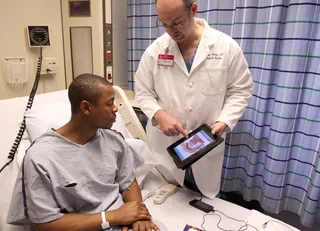Health Rewind: Is Diagnosing Someone With “Ghetto Booty” Offensive?
Plus; Hampton U. gets $13.5 million for health research.

1 / 10
Woman Files Complaint for Being Diagnosed With “Ghetto Booty” - Terry Ragland, a 55-year old African-American woman, has filed a complaint with the Tennessee Department of Health against her doctor for diagnosing her with “ghetto booty” for her lower back pain. Ragland is offended by the lack of sensitivity on her doctor’s part. The real term for Ragland’s ailment is called “lumbar lordosis,” reported a Memphis CBS affiliate. —Kellee Terrell(Photo: Courtesy CNN)

2 / 10
People With Bipolar Disorder Die Younger - Women with bipolar disease die nine years sooner — and men 8.5 — than those who no not suffer from the disorder says a new study. Researchers from Switzerland found that while suicide was higher among this group, so was heart disease and cancer. They noted that better primary care to help prevent certain illnesses is key for those with bipolar disease, reported the Huffington Post. (Photo: Getty Images)

3 / 10
New Gonorrhea Treatments in Clinical Trials Are Hopeful - More Americans are growing resistant to the current gonorrhea treatments available, but now there is some good news. The Centers for Disease Control and Prevention announced that two new medications are successful in treating the common STD. The most recent injectable drug is 100 percent effective and the oral one is 99.5 effective in curing the infection. (Photo: Stephen Chernin/Getty Images)

4 / 10
Are Black Men With Cancer Receiving Worse Follow Up Care? - Older African-American and Latino male cancer survivors are less likely to seek preventative care for other illnesses, researchers from Wake Forest found. A new study suggests that these men were less likely to see their primary physician, seek specialty care and receive both the flu and pneumonia vaccines, says a university press release. (Photo: Christopher Furlong/Getty Images)

5 / 10
The Longer You Are Obese, the More It Damages Your Heart - Being obese in your 20s, 30s and 40s can increase your risk for heart disease and strokes later in life, says the American Heart Association. For every year young folks were obese, their risk of developing hardened plaque in the arteries increased by 2 to 4 percent, wrote USA Today. This new study is the first to find a link between the duration of obesity and coronary disease. (Photo: REUTERS/Finbarr O'Reilly /Landov)
ADVERTISEMENT

6 / 10
Blacks Most Often the Victims of Gun Violence - A new CDC report finds that young people are four times more likely to be killed by guns than by stabbing, poising or strangling. Researchers also found that “males aged 20-24 and Black people are murdered at higher rates than the overall average,” Reuters reported. (Photo: Scott Olson/Getty Images)

7 / 10
More New York City High Schools Passing Out Plan B - A recent New York Times article highlights how 50-plus NYC high schools are passing out Plan B to female students in need of the emergency contraceptive, especially in areas with higher teen pregnancy rates. New York isn’t the only city that’s doing this — schools in Chicago, Oakland, CA., Baltimore and all over the state of Colorado also administer the pill to students in need. (Photo: Justin Sullivan/Getty Images)

8 / 10
Can Practicing Yoga Bring Down School Suspensions? - Instead of suspending “willful” and “unruly” students from school, Los Angeles’ school board implemented Youth Empowerment Seminar (YES!), a new program that helps reduce stress and aggressive behavior among at-risk youth. Students who finish the 4-week program, which includes practicing yoga and breathing exercises, are less impulsive says a new study, reported Science Daily.(Photo: Getty Images/Blend Images)

9 / 10
Texas Passes Strict Abortion Bill - One week after the Texas Senate passed one of the most controversial and strictest abortion laws in its state history, the state's governor Rick Perry signed the bill into law on Thursday, ABC reported. House Bill 2 makes abortion past 20 weeks illegal and lays down stricter regulations for reproductive health clinics, basically shutting down 37 of 42 clinics throughout the state.(Photo: AP Photo/Tamir Kalifa)
